七年级英语下册形容词副词讲义(新版)人教新目标版
七年级英语下册阅读理解讲义(新版)人教新目标版
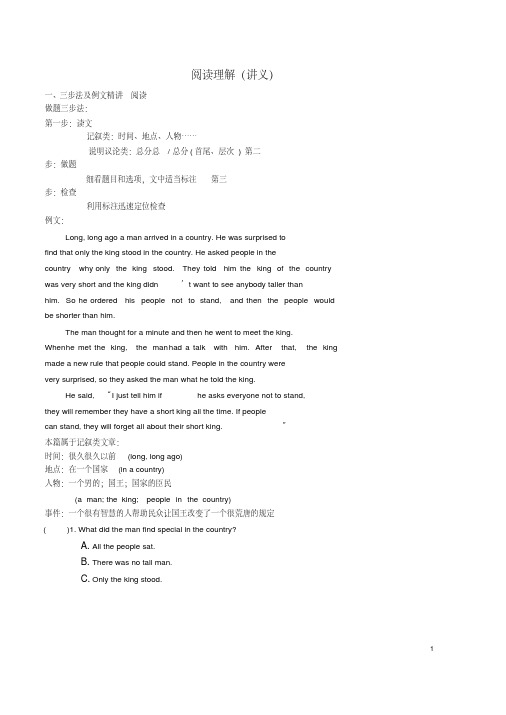
阅读理解(讲义)一、三步法及例文精讲阅读做题三步法:第一步:读文记叙类:时间、地点、人物……说明议论类:总分总/总分(首尾、层次) 第二步:做题细看题目和选项,文中适当标注第三步:检查利用标注迅速定位检查例文:Long, long ago a man arrived in a country. He was surprised tofind that only the king stood in the country. He asked people in thecountry why only the king stood. They told him the king of the country was very short and the king didn’t want to see anybody taller thanhim. So he ordered his people not to stand, and then the people would be shorter than him.The man thought for a minute and then he went to meet the king.When h e met the king, the man had a talk with him. After that, the king made a new rule that people could stand. People in the country werevery surprised, so they asked the man what he told the king.He said, “I just tell him if he asks everyone not to stand,they will remember they have a short king all the time. If peoplecan stand, they will forget all about their short king. ”本篇属于记叙类文章:时间:很久很久以前 (long, long ago)地点:在一个国家 (in a country)人物:一个男的;国王;国家的臣民(a man; the king; people in the country)事件:一个很有智慧的人帮助民众让国王改变了一个很荒唐的规定( )1. What did the man find special in the country?A.All the people sat.B.There was no tall man.C.Only the king stood.D.All people there weretall. ( )2. What did the king looklike?A.He was heavy.B.He was thin.C.He was tall.D.He was short.( )3. What did the man do after he heard that rule?A.He laughed at the king.B.He started to sit down.C.He had a talk with the king.D.He left the country.( )4. What can we infer(推断) from the passage?A.The man was smart.B.The king was shy.C.The man was scared.D.The king was lazy.( )5. Why did the king make a new rule?A.He was afraid of that man.B.He was afraid of the people in the country.C.He liked different rules.D.He didn’t want his people to remember he was short.二、阅读精选 (1)Frank is my friend. His family is rich. His parents always givehim lots of pocket money. But Frank thinks his parents work very hard and it’s not easy for them, so he always tries his best to save money. He has some good ways to do it.Frank likes reading. He has lots of books. He tells me he oftenbuys books online, because they’re cheaper. And when he has free time, he often goes to bookstores or libraries to do some reading.Frank has a bike. He usually goes to school by bike. Sometimes when it rains or snows, he walks. These two ways help Frank keephealthy and save some money.Frank brings a bottle of water to school every day. When other students drink juice, he enjoys his water. He thinks water is the cheapest but the best drink.Some students think Frank is mean. But I don’t think so. Ithink he is right. What do you think of him?本篇是说明类文章:总:(第 1 段)交代 Frank 是个家里很富但自己却很节俭的人。
最新新编七年级英语下册第二单元讲义重点短语语法归纳及练习新版人教新目标版
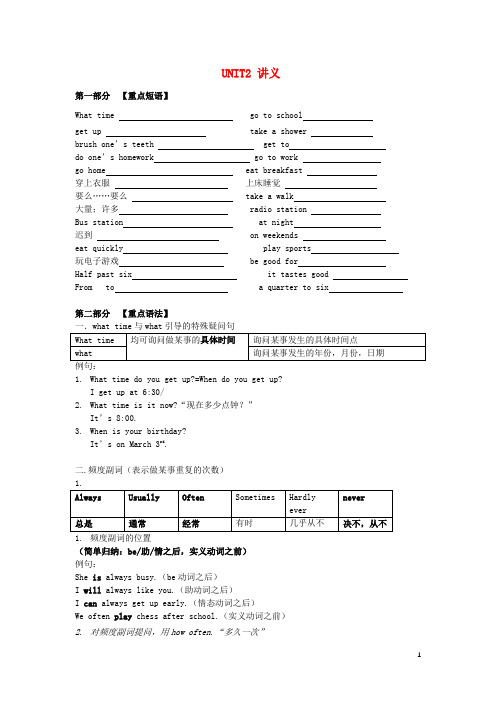
UNIT2 讲义第一部分【重点短语】What time go to schoolget up take a showerbrush one’s teeth get todo one’s homework go to workgo home eat breakfast穿上衣服上床睡觉要么……要么 take a walk大量;许多 radio stationBus station at night迟到 on weekendseat quickly play sports 玩电子游戏 be good forHalf past six it tastes good From to a quarter to six第二部分【重点语法】一.what time与what引导的特殊疑问句例句:1.What time do you get up?=When do you get up?I get up at 6:30/2.What time is it now?“现在多少点钟?”It’s 8:00.3.When is your birthday?It’s on March 3rd.二.频度副词(表示做某事重复的次数)1.1.频度副词的位置(简单归纳:be/助/情之后,实义动词之前)例句:She is always busy.(be动词之后)I will always like you.(助动词之后)I can always get up early.(情态动词之后)We often play chess after school.(实义动词之前)2.对频度副词提问,用how often.“多久一次”-How often do you exercise? 你多久锻炼一次?-I never do exercise. 我从不。
【试一试】1.— is Mid-Autumn Day(中秋节) in China?—It’s August 15th.A.What time; onB.When; onC.What time; inD.When; in2.Do you often go fishing with your father?—No, .I don't like fishing.A.neverB.alwaysuallyD.everyday三.时间表达法整点法:at 6:00 → at six/at six o’clock顺读法:先时钟后分钟的顺序6:20 six twenty 3:45逆读法:先分钟后时钟的顺序①分钟数小于等于30:“past”.表示“几点过了几分” (分钟数+past+时钟)Twenty past one Half past six a quarter past one②分钟数大于30:“to”,表示“差几分到几点”[(60-分钟数)+to+(时钟+1)]Five to six 5:55 ten to six 8:45第三部分综合练习题一. 单项填空。
人教版(新目标)初中英语形容词与副词的比较级与最高级
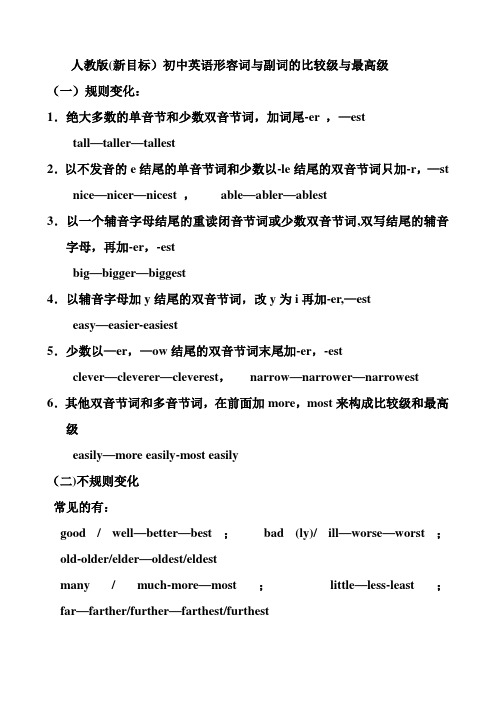
人教版(新目标)初中英语形容词与副词的比较级与最高级(一)规则变化:1.绝大多数的单音节和少数双音节词,加词尾-er ,—esttall—taller—tallest2.以不发音的e结尾的单音节词和少数以-le结尾的双音节词只加-r,—st nice—nicer—nicest ,able—abler—ablest3.以一个辅音字母结尾的重读闭音节词或少数双音节词,双写结尾的辅音字母,再加-er,-estbig—bigger—biggest4.以辅音字母加y结尾的双音节词,改y为i再加-er,—esteasy—easier-easiest5.少数以—er,—ow结尾的双音节词末尾加-er,-estclever—cleverer—cleverest,narrow—narrower—narrowest 6.其他双音节词和多音节词,在前面加more,most来构成比较级和最高级easily—more easily-most easily(二)不规则变化常见的有:good / well—better—best ;bad (ly)/ ill—worse—worst ;old-older/elder—oldest/eldestmany / much-more—most ;little—less-least ;far—farther/further—farthest/furthest用法:1.原级比较:as + adj。
/adv。
+as(否定为not so/as + adj。
/adv. +as)当as… as中间有名字时,采用as + adj。
+ a + n.或as + many / much + n.This is as good an example as the other is 。
I can carry as much paper as you can.表示倍数的词或其他程度副词做修饰语时放在as的前面This room is twice as big as that one.倍数+as+adj。
初中英语语法—形容词、副词PPT课件

2. Don’t worry. There is __C__ about your illness.
A.serious something B. anything serious
C. nothing serious D. some thing
3.There is __C__ in today’s newspaper. It’s boring.
1.Is there anything interesting in today’s newspaper ?
2. I have something important to tell you.
-
7
1. Sam is hungry, he’d like to eat _C___delicious.
A. some B. any C. something D. somewhere
The windows of our classroom are cleaner than those of theirs.
-
23
1、as+形容词原形+as
Tom is as tall as Mike.
There are as many students in our
school as yours.
3、… too+原级+ to do sth.
He is too young to join the army.
4、形容词原级+ enough to do sth.
This truck is big enough to carry 5 tons.
-
25
1、两者之间的比较,句中有明显的标志词than
Tom is taller than John
七年级英语下册 Unit9 What does he look like整体分析教案人教新目标版
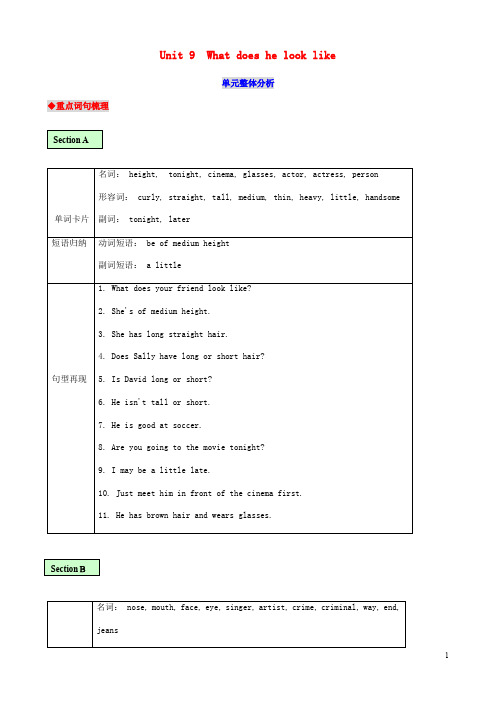
Unit 9 What does he look like单元整体分析◆重点词句梳理◆教材内容解读本单元的中心话题是“描述人物外貌”。
Section A 部分有两个方面的内容:一是人物外貌描述及相关词汇;二是用选择疑问句询问人物外貌。
Section B 部分是Section A的拓展,从人物的发饰、脸型、五官、眼镜、胡子、职业等各方面描述人物外貌,巩固人物描述的语言结构。
◆功能话题应用What does he look like?He’s of medium build.Is he tall or short?He’s tall.Do they have straight or curly hair?They have curly hair.◆语法结构点击1. 选择疑问句。
2. 描述他人外貌。
背景知识链接◆采用新教案P177话题相关链接。
Section A新课备课素材◆素材一新课导入设计导入一图片导入: Ss show their pictures and describe the person in the picture ; lead to the new words and sentences with the pictures ; then lead to the new lesson.导入二Guessing Game:Describe a student or a teacher in your class. Other Ss guess who is he/she. Then lead to the new lesson.导入三I’m the model. The teacher choose three Ss as the models: a fat and tall boy, of medium heighta thin and short boy. The models describe themselves. Then the teacher lead to the new words and lesson.导入四 Brainstorming: Write down the words as many as possible about physical appearance. And then lead to the new lesson.◆素材二新课活动案例活动 1 采用新教案P178活动设计1和活动设计2.活动 3 Game: Who is the fastest? (详见PPT)活动 4 Role-play(分角色表演,强化巩固描述外貌特征为话题的情景对话。
(最新版)人教版初中英语形容词副词知识点总结归纳重难点汇总复习资料大全【精品推荐】
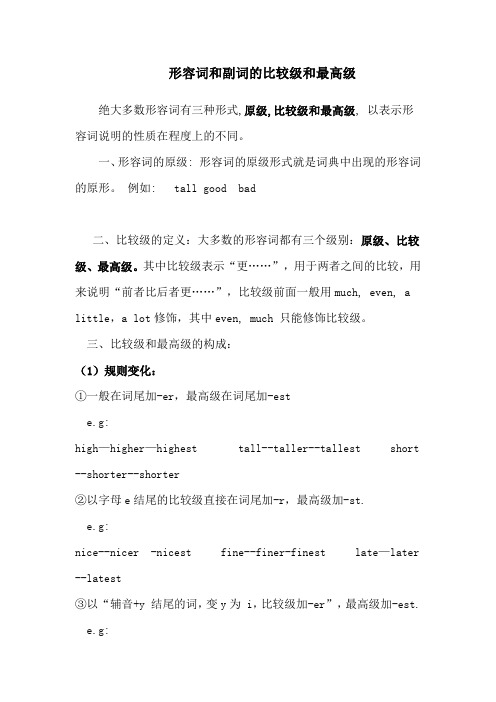
形容词和副词的比较级和最高级绝大多数形容词有三种形式,原级,比较级和最高级, 以表示形容词说明的性质在程度上的不同。
一、形容词的原级: 形容词的原级形式就是词典中出现的形容词的原形。
例如: tall good bad二、比较级的定义:大多数的形容词都有三个级别:原级、比较级、最高级。
其中比较级表示“更……”,用于两者之间的比较,用来说明“前者比后者更……”,比较级前面一般用much, even, a little,a lot修饰,其中even, much 只能修饰比较级。
三、比较级和最高级的构成:(1)规则变化:①一般在词尾加-er,最高级在词尾加-este.g:high—higher—highest tall--taller--tallest short --shorter--shorter②以字母e结尾的比较级直接在词尾加-r,最高级加-st.e.g:nice--nicer -nicest fine--finer-finest late—later --latest③以“辅音+y 结尾的词,变y为 i,比较级加-er”,最高级加-est.e.g:early—earlier-earliest happy—happier-happiest bus y—busier-busiest④以重读闭音节的单个辅音字母结尾的词,双写辅音字母,比较级加-er,最高级加-este.g: big—bigger-biggest fat-fatter-fattest thin—thinner-thinnest hot—hotter-hottest⑤多音节或部分双音节的形容词,比较级在原级前面加more,最高级在原级前加moste.g: popular--more popular—mostpopular important--more important—most important (2)不规则变化:少数形容词的比较级变化是不规则的:good/well—better--best bad/badly—worse--worst man y/much—more--mostlittle—less--least far--farther/further—farthest/furt hest四、比较级的用法:(一)当两个人或事物(A和B)进行比较时,我们需要用到形容词(副词)的原级或者比较级1.表达“A和B一样”,用as…as的结构。
新版-人教版七年级英语下册第五单元教案资料讲解
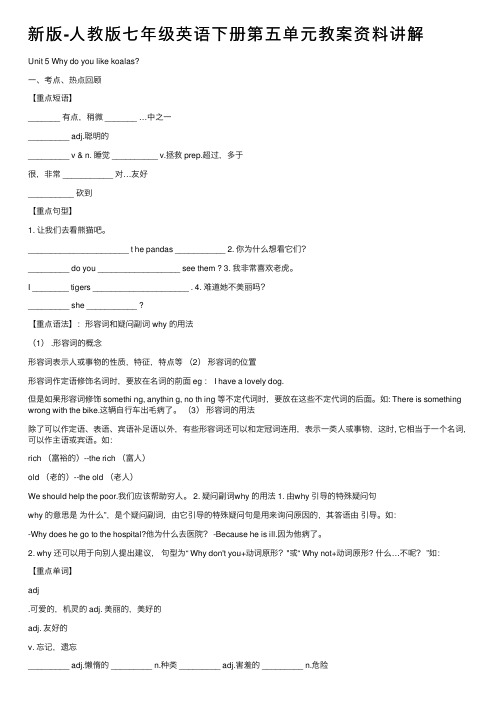
新版-⼈教版七年级英语下册第五单元教案资料讲解Unit 5 Why do you like koalas?⼀、考点、热点回顾【重点短语】_______ 有点,稍微 _______ …中之⼀_________ adj.聪明的_________ v & n. 睡觉 __________ v.拯救 prep.超过,多于很,⾮常 ___________ 对…友好__________ 砍到【重点句型】1. 让我们去看熊猫吧。
______________________ t he pandas ___________ 2. 你为什么想看它们?_________ do you __________________ see them ? 3. 我⾮常喜欢⽼虎。
I ________ tigers _____________________ . 4. 难道她不美丽吗?_________ she ___________ ?【重点语法】:形容词和疑问副词 why 的⽤法(1) .形容词的概念形容词表⽰⼈或事物的性质,特征,特点等(2)形容词的位置形容词作定语修饰名词时,要放在名词的前⾯ eg : I have a lovely dog.但是如果形容词修饰 somethi ng, anythin g, no th ing 等不定代词时,要放在这些不定代词的后⾯。
如: There is something wrong with the bike.这辆⾃⾏车出⽑病了。
(3)形容词的⽤法除了可以作定语、表语、宾语补⾜语以外,有些形容词还可以和定冠词连⽤,表⽰⼀类⼈或事物,这时, 它相当于⼀个名词,可以作主语或宾语。
如:rich (富裕的)--the rich (富⼈)old (⽼的)--the old (⽼⼈)We should help the poor.我们应该帮助穷⼈。
2. 疑问副词why 的⽤法 1. 由why 引导的特殊疑问句why 的意思是为什么”,是个疑问副词,由它引导的特殊疑问句是⽤来询问原因的,其答语由引导。
人教新目标版2020-2021年七年级英语下册第五单元讲义重点短语语法归纳及练习
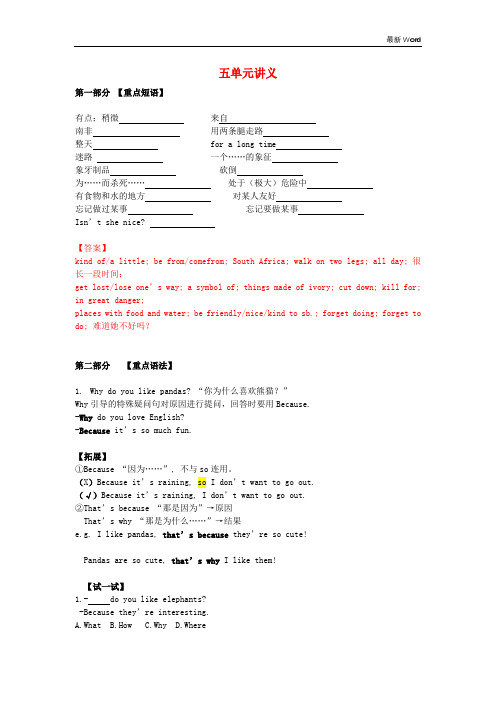
五单元讲义第一部分【重点短语】有点;稍微来自南非用两条腿走路整天 for a long time迷路一个……的象征象牙制品砍倒为……而杀死……处于(极大)危险中有食物和水的地方对某人友好忘记做过某事忘记要做某事Isn’t she nice?【答案】kind of/a little; be from/comefrom; South Africa; walk on two legs; all day; 很长一段时间;get lost/lose one’s way; a symbol of; things made of ivory; cut down; kill for; in great danger;places with food and water; be friendly/nice/kind to sb.; forget doing; forget to do; 难道她不好吗?第二部分【重点语法】1.Why do you like pandas? “你为什么喜欢熊猫?”Why引导的特殊疑问句对原因进行提问,回答时要用Because.-Why do you love English?-Because it’s so much fun.【拓展】①Be cause “因为……”, 不与so连用。
(X)Be cause it’s raining, so I don’t want to go out.(√)Because it’s raining, I don’t want to go out.②That’s because “那是因为”→原因That’s why “那是为什么……”→结果e.g. I like pandas, that’s because they’re so cute!Pandas are so cute, that’s why I like them!【试一试】1.- do you like elephants?-Because they’re interesting.A.WhatB.HowC.WhyD.Where2.I didn’t go surfing it was too cold.A.soB. andC. becauseD.that’s why3. 我迟到了,那是为什么Mr.Su生气了。
- 1、下载文档前请自行甄别文档内容的完整性,平台不提供额外的编辑、内容补充、找答案等附加服务。
- 2、"仅部分预览"的文档,不可在线预览部分如存在完整性等问题,可反馈申请退款(可完整预览的文档不适用该条件!)。
- 3、如文档侵犯您的权益,请联系客服反馈,我们会尽快为您处理(人工客服工作时间:9:00-18:30)。
形容词副词【key points】形容词的基本用法概念:形容词修饰名词或代词,表示人或事物的特征。
【exercise】一、翻译1.咖啡很苦,但是加了糖的咖啡就不苦了。
2.这些面包尝起来很好吃。
3.我喜欢苦咖啡和美味面包。
-ing & -ed 形容词This is surprising news and we are surprised.【exercise】一、填空。
1.This is an book. I am in it. (interest)2.He is very _ and he always makes us laugh. (interest)3.I like taking a bath after sports because it is . (relax)二、单选。
1.The movie is and all of us are .A.frighten; frighteningB. frightening; frightenC. frightened; frighteningD. frightening; frightened2.He was so when he heard the news.A.exciting; excitingB. exciting; excitedC. excited; excitedD. excited; exciting3.I really need a vacation.A.tiredB. relaxingC. relaxedD. excited4.I am very when I lie on the bed.A.relaxedB. relaxingC. relaxesD. relax5.They are very that their son can cook dinner for them.A.surpriseB. surprisedC. surprisingD. surprises复合形容词由两个或以上的单词组成,可修饰名词,中间有连字符【exercise】一、单选1.There is a boy in the boat.A.three years oldB. three-years-oldC. three-year-oldD. three year old2.He is and he has an brother.A.ten-year-old; eight years oldB.ten years old; eight-year-oldC.ten year old; eight-years-oldD.ten year old; eight year old3.We’ll have a holiday. What about going to Shaolin Temple?A.two daysB. two-dayC. two-day’sD. two-days4.This Chinese book is .A.25 centimeter wideB. 25 centimeters wideC. wide 25 centimeterD. 25 wide centimeters5.David’s little sister is only eight .A.months oldB. month oldC. year’s oldD. year old6.The little girl wrote a letter to her aunt.A.five-hundred-wordsB. five-hundred-wordC. five-hundreds-wordD. five-hundreds-words当形容词遇上复合不定代词复合不定代词:由some-, any-, no-, every-加上-one, -body, -thing 组成复合不定代词 +形容词【exercise】一、单选。
1.Tom came in and said he had to tell the class.A.anything importantB. important everythingC. something importantD. important something2.—Your coffee, please.—There must be in the coffee. I like this kind of coffee with sugar.A.nothing sweetB. something sweetC. sweet somethingD. sweet nothing3.Is there with your bike?A.wrong somethingB. wrong anythingC. something wrongD. anything wrong4.—Would you like to drink?—Yes, I’d like a cup of coffee.A.something elseB. else somethingC. anything elseD. else anything5.—Could you please tell me in today’s newspaper?—Sorry, .A.something special; special nothingB.special something; special nothingC.something special; nothing specialD.special something; nothing special副词的基本用法概念:用以修饰动词、形容词或其他副词的词。
【exercise】翻译1.教室里很安静,大家正在安静地学习。
2.Lucy 是个快乐的女孩,她总是开心地笑。
【综合练习】一、填空。
1.You should be in the exam. (care)2.You should do your homework . (care)3.Allan did the exercises too (粗心) , and it made his teacher very angry.4.We eat food. (health)5.A baby is crying . (loud)6.Listen! The lovely birds are singing nicely and (soft).7.Look at the little dog. It’s playing with the(friend) little cat.二、单选。
1.Nancy looked very when she heard the bad news.A.happyB. happilyC. sadD. sadly2.Is this a photo of your sister? She looks in the pink dress!A.lovelyB. quietlyC. politelyD. happily3.It suddenly began to rain .A.hardlyB. heavilyC. heavyD. away4.Jim said he would go , but then he drove very fast.A.earlyB. quicklyC. directlyD. slowly5.Her are very _ to us. We all like them.A.friendly; friendlyB.friends; friendlyC.friend; friendlyD.friendly; friendsgood & well 辨析good adj. 好的well adv. 好地; adj. 身体好; n. 井【exercise】一、单选。
1.My little sister sings _ .A.niceB. wellC. goodD. very good2.Lin Shuhao is a basketball star. Heplays basketball .A.good; niceB. good; wellC. well; goodD. well; well3.—Would you like to have dinner with me?—That sounds . I’m hungry now.A.badB. wellC. goodD. boring4.This kind of dress looks and sells .A.good ; wellB. well; niceC. good; goodD. well; well5.Kim is at English in our class, and Lily does in it, too.A.well; goodB. good; wellC. good; goodD. well; wellhard & hardly 辨析hard adj. 困难的;硬的;adv. 努力地hardly adv. 几乎不【exercise】一、单选。
1.She thought , then she had an good idea.A.hardB. hardlyC. veryD. quite2.—Does Adam always finish his homework on time?—Yes, of course. He _ leav es today’s work for tomorrow.A.alsoB. hardlyC. onlyD. usually3.Tom worked very _before the English exam because hespent time remembering words these months.A.hard; hardB. hardly; hardlyC. hardly; hardD. hard; hardly4.Though he has studied at Russian for ten months, he can stillspeak the language.A.hard; hardB. hardly; hardlyC. hard; hardlyD. hardly; hard讲义参考答案形容词的基本用法翻译:1.Coffee is bitter, but it isn’t bitter withsugar. 2.These bread tastes delicious.3.I like bitter coffee and delicious bread.-ing & -ed 形容词一、填空。
